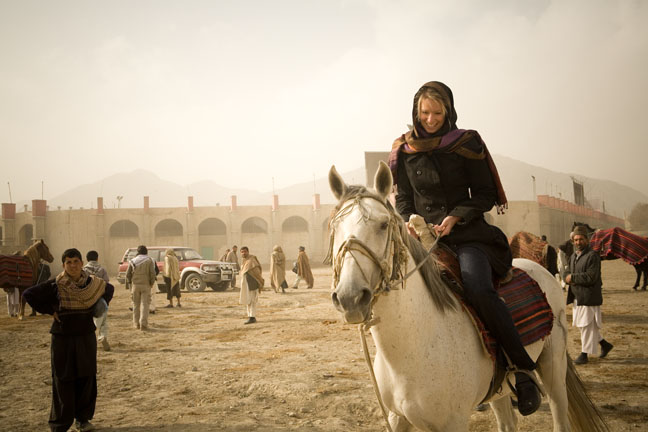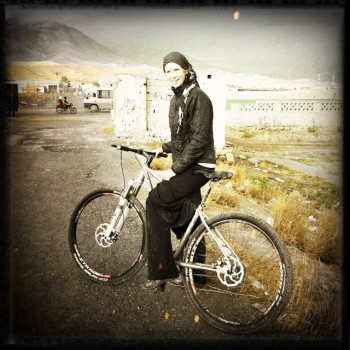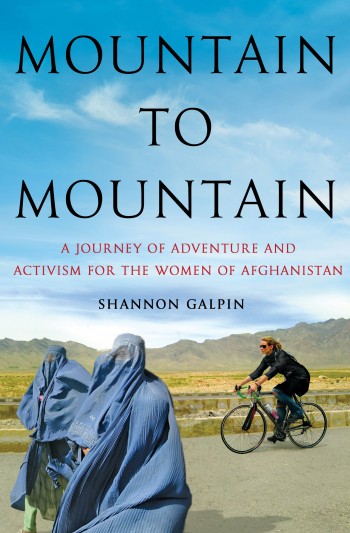Reads We Love: The Memoir of Activist Shannon Galpin

Debuted yesterday, the memoir of Shannon Galpin is a gripping story of this human rights activist’s highs and lows—and her battle for girls and women’s education and equality in Afghanistan.
A recount of her thirties, Mountain to Mountain: A Journey of Adventure and Activism for the Women of Afghanistan, takes readers through the pitfalls and triumphs of Galpin’s self growth, cross-cultural awareness, and international efforts to challenge gender inequality. Out of her own victimization, Galpin became committed to helping others.
She founded the nonprofit Mountain2Mountain, which focuses on combating gender violence in Afghanistan—by riding a bike. In 2009, at a time when it was completely taboo for women to ride a bike, Galpin became the first woman to mountain bike in Afghanistan. Now, she’s continued to use her pedal power to raise social awareness for women’s rights.
Here, WomensMovement touches base with the mother and adventurer to see what’s between the pages:
WomensMovement.com: What’s your new book about?
Shannon Galpin: This book chronicles my journey from rape victim to activist, from mother to mountain biker, from founder of the nonprofit Mountain2Mountain to National Geographic Adventurer of the Year. Readers will experience my adventures in Afghanistan on bikes, motorcycles, and road trips; they will see a side of Afghanistan rarely shown and learn how I worked to break gender barriers.
Readers will join me in Afghan women’s prisons, deaf schools, and meetings with female members of Parliament. Through my adventures and work to challenge gender inequity I learned to embrace my vulnerability as my source of strength, and along the way I discovered the first Afghan women to ride bikes.
WM: What period of your life does your memoir chronicle?
Shannon Galpin: The book focuses primarily on my 30’s: Founding the nonprofit Mountain2Mountain, discovering my passion for mountain biking, traveling to Afghanistan, becoming a mother, and finding my voice to challenge gender barriers and fight for women’s rights.
WM: What’s the intended purpose of your memoir?
Shannon Galpin: I want to challenge the idea of what it is to be a woman and adventurer and mother, while inspiring women to use their voice and create change.

WM: When did you begin writing this memoir, and what has the process been like for you?
Shannon Galpin: I started writing this two years ago. The majority of the initial writing process was seemingly cathartic and the Afghan chapters just flowed. The chapters set in the U.S.—which are less about experiences and more about emotions—were much harder. But, the real challenge was editing. I am not a detail-oriented person and the editing process was incredibly difficult, even with the help I had.
WM: When did you realize that you wanted to write a personal memoir?
Shannon Galpin: I became sick of seeing articles about me that got it wrong—that missed the depth and complexities of what I was trying to do and who I was as a person. That discontent rose in tandem with discovering my own motivations, which came from some dark places in my past that I hadn’t really processed.
Once I did, I realized that the choices that I had made as a mother, daughter, and activist needed to be reconciled. Women who have experienced gender violence, like myself, often don’t share their story—so, the problem worsens, which we are seeing on a global scale. I wanted to publicly share my journey as an activist, mother, victim of violence, and an adventurer in order to show the complexities that reside in all of us—and how those shape our journey.
WM: Was it difficult for you to share parts of your story?
Shannon Galpin: Definitely. I am quite private in many ways, and yet I felt that writing this book was important to open up a conversation on several levels. Detailing my rape was difficult, as I had kept that to myself for twenty years. Writing it out was therapeutic and challenging, but in the end I felt that it could illuminate the realities that too many women go through.
It was also difficult to share the parts of my story about the choices that I make as a mother and the financial difficulties. Those details take a great deal of vulnerability to share, and I’m not known for my vulnerability!
Shannon’s memoir hit shelves on September 16, 2014. Before grabbing a copy, enjoy a sneak peak excerpt here on WomensMovement:
So there we were, standing on the side of a highway leading out of Kabul, watching the girls get their bikes off the roof of Coach’s white Land Cruiser for a training ride. We watched them pull out on the highway with apprehension. Men stared at the girls from all directions, cars honked, trucks swerved around each other in typical Afghan mayhem.
The girls seemed so vulnerable on their skinny tires entering the fray. Standing on the side of the road, I felt the mayhem as dust swirled, and the wind gusts challenged the girls to hold their line. There was a sense on the crew of heavy responsibility and we all gut check ourselves as they pedaled off. None of us felt good about watching them ride here.
This was seriously dangerous riding, not just because they were girls doing something Afghan women didn’t do, but because it was a trucking highway where driving a car was dangerous enough. The brightly painted, intricately decorated Pakistani trucks roared down the highways, creating huge gusts of dusty wind as they passed. I reminded myself that the girls weren’t doing this for us; this was their training ground and they faced these risks every time they pedaled. We just needed to document and share their incredible story.
Standing on the side of an Afghan highway, I thought back to all the things that led me to this place: my rape, Larissa’s rape, Devon’s birth, ten years working as a sports trainer, a life lived in multiple countries, my love of mountain biking and exploration—all bricks in the foundation that brought me to Afghanistan and brought me deeper into my truest self. Working here, I began to realize that my deeper motivations could be a simple desire to believe that my own beauty could emerge through my heartbreak.
That women’s voices matter. A desire to express and thus be understood through my own layers of complexity. The hope that reconciliation and forgiveness can be found within me for those who tried to break me. That if I can find forgiveness for the man that raped me and nearly killed me, I can find compassion in humanity itself.

Kamagra oral jelly Online something to buy the most convenient way. He doesn’t demand from you any actions except how to visit the website. And in separate with goods necessary to you to put the end. To specify your address and to wait for the supplier to whom you will give money.


LET'S GET SOCIAL